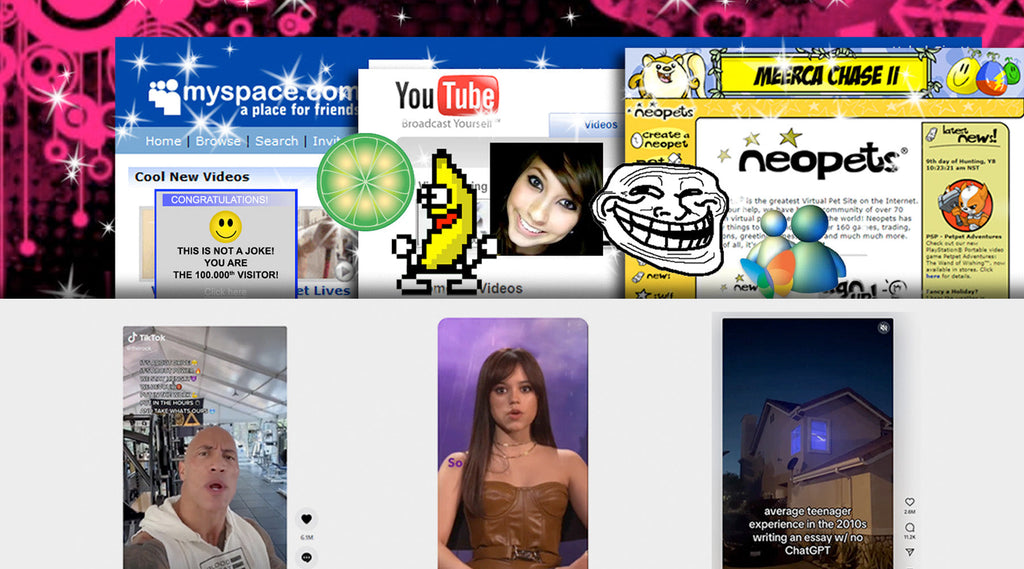
Why the Internet Sucks Now...

Creating the perfect AIM away message. Carefully curating your Top 8 on MySpace. Playing Neopets for hours. The old internet gave us endless little portals of escape. Every site felt different, full of its own weird magic and personality. Now, Everything feels the same. Scroll TikTok, Instagram, YouTube, or Facebook—it’s the same features, same trends, same vibes. A homogenized, ad-driven marketplace instead of the creative playground we grew up with. So how did we get here? How did the internet, once a sanctuary we escaped to, become something we now want to escape from?

Creativity and Authenticity
Millennial internet nostalgia is a cocktail of the chaotic, the questionable, and the wonderfully authentic. You searched what you wanted and found it—no algorithm, no sponsored posts. Forums, niche fan sites, quirky blogs, everything felt personal. Social media wasn’t a career path. No one cared about metrics. People just showed up as themselves, in all their glitchy, glittery glory. Somewhere along the way, we lost that. Now, instead of being a place to express ourselves, the internet often feels like a performance stage with a never-ending audience.

From Personal Expression to Algorithm Addiction
Back then, we found content through curiosity. Today, content finds us, whether we like it or not. Platforms like MySpace and LiveJournal helped us connect through shared interests, especially in music and personal stories. YouTube brought creators into our lives because we wanted to find them, not because they were fed to us. That sense of discovery was exciting. It felt like stumbling upon treasure. Now, the algorithm decides what’s “worth” seeing, and personal expression often gets buried beneath whatever drives engagement.
When the Internet Became a Marketplace
As user-generated content exploded, companies saw dollar signs. Influencers became brands. Social platforms turned into storefronts. Everything started to look and feel the same. Everything is polished, performative, and profit-driven. Gone was the quirky, messy web we grew up with. Instead, we got apps that look identical, feeds that function the same, and content optimized for ad revenue, not for human connection. The shift from desktops to phones made it worse. We used to have natural limits, our time online was tied to a shared family computer. Now the internet’s always in our pockets, always on, always calling. It’s no wonder so many of us feel burned out.
Navigating the Digital Noise as Parents
For millennial parents, the always-on internet hits harder. We're not just online, we’re raising kids in it. And that’s exhausting. The pressure to be perfect, to parent like the curated families we see online, is overwhelming. We grew up in digital spaces full of creativity and connection. Now those spaces feel algorithmically hostile—especially for kids. And kids are exposed earlier than ever. The platforms they encounter today often push content that’s toxic, shallow, or addictive. It’s hard to recreate the magic of the early internet in this climate, but that doesn’t mean we shouldn’t try. Our kids deserve a digital world that still sparks curiosity, connection, and creativity.
Taking Back the Online Experience
We don’t hate the internet because we’re old. We hate it because we remember what it could be. Back then, logging off was natural, computers weren’t in our pockets. Today, it takes intention. But it’s possible. Turn off push notifications. Keep phones out of sight during downtime. Create screen-free zones. Small moves like these help us model healthy tech use for our kids without turning into the “no screens ever” stereotype. With tools like Quvo, it’s easier to set digital boundaries that protect our kids and give them space to explore their own weird, wonderful corners of the internet. We might not be able to bring back the exact version of the internet we loved, but we can help build one that’s better for them!



















